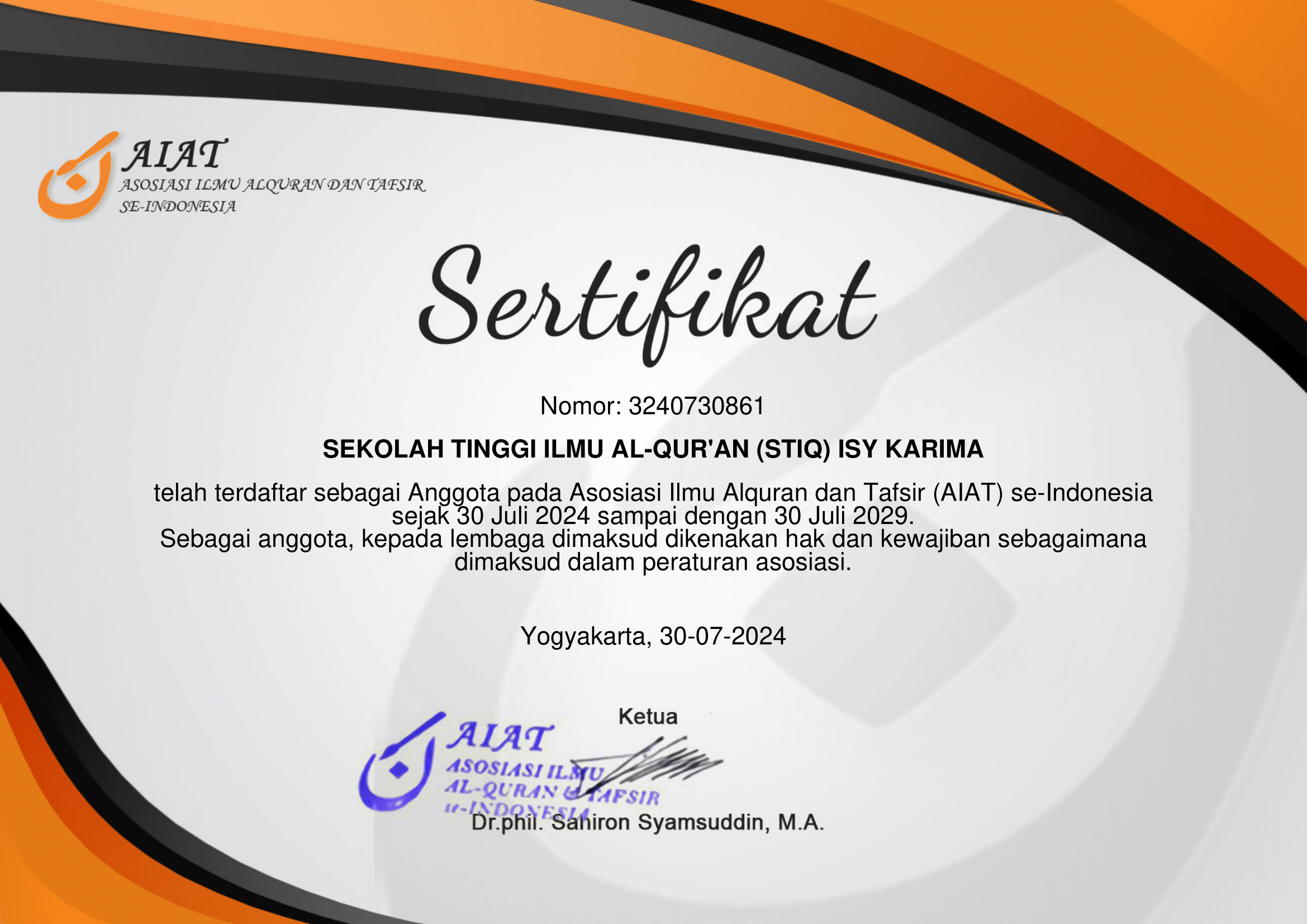Pendidikan Anak dalam Al-Qur’an
Studi Komperatif Tafsir Fi Dzilalil Qur’an dan Tafsir Al Azhar Terhadap Surat Luqman Ayat 12-19
DOI:
https://doi.org/10.58438/alkarima.v2i2.47Keywords:
Pendidikan Anak, Surat Luqman ayat 12 - 19, Tafsir Al-AzharAbstract
Fungsi Al-Qur’an diantaranya adalah memberikan solusi terhadap masalah kehidupan masyarakat, termasuk kemerosotan moral pada anak yang terjadi di zaman sekarang ini. Namun selain itu harus ada jiwa-jiwa dan semangat orang tua untuk membekali anak dalam melawan tantangan melalui pendidikan anak secara benar. Penelitian ini bertujuan untuk mengetahui penafsiran Sayyid Quthb dan Buya Hamka terhadap ayat pendidikan anak dalam surat Luqman ayat 12-19. Metode yang digunakan dalam penelitian ini adalah metode muqorin (metode komparasi). Hasil penelitian menunjukkan bahwa dalam menafsirkan surat Luqman ayat 12-19, baik Buya Hamka maupun Sayyid Quthb memberikan makna yang sama, saling menguatkan satu sama lain. Ayat 12 mengarahkan kepada kesyukuran, ayat 13 merupakan nasihat yang mengandung pengikraran tauhid, ayat 14 mengandung syukur kepada orang tua, ayat 15 menunjukkan ikatan nasab berada dalam urutan setelah ikatan akidah, ayat 16 menunjukkan bahwa Allah Maha Teliti atas segala sesuatu, ayat 17 merupakan perintah shalat, amar ma’ruf nahi munkar, dan bersabar dalam berdakwah, ayat 18 merupakan larangan berbuat sombong, dan ayat 19 menerangkan etika berjalan dan berbicara kepada orang lain. Namun, dari penafsiran tersebut ada beberapa perbedaan dalam penafsiran mereka. Pertama, dalam penasfirannya Buya Hamka memberikan judul pada pembahasan tema, sedangkan Sayyid Quthb tidak memberikan tema. Kedua, penafsiran Buya Hamka lebih banyak memberikan penjelasan riwayat hadits dibandingkan penafsiran Sayyid Quthb. Ketiga, Buya Hamka lebih banyak memberikan analogi dan contoh-contoh dalam masyarakat yang berkaitan dengan tema ayat dibandingkan penafsiran Sayyid Quthb. Rumusan pendidikan yang terkandung dalam surat Luqman ayat 12-19 adalah: mengajarkan bersyukur, mengajarkan tauhid, berbakti kepada kedua orang tua, merasa di bawah pengawasan Allah, pendidikan shalat, amar ma’ruf nahi munkar, belajar sabar, larangan berbuat sombong, sederhana dalam berjalan, dan berbicara dengan pelan dan lembut.
Downloads
References
Afifuddin. 2012. Metodologi Penelitian Kualitatif. Bandung: Tim Pustaka Setia. Cet -2.
Adz Dzahabi, Muhammad Husain. 2003. At Tafsir wal Mufasiirun. Maktabah Mush’ab bin Umair. Cet- IV.
Al Bukhari, Abu Abdillah Muhammad ibn Isma’il. 2001. Shahih al-Bukhari. Beirut: Dar Al Kutub Al Ilmiyah.
Al Khalidi, Shalah Abdul Fatah. 2001. Pengantar Memahami Tafsir Fi Zhilalil Qur’an. Terj. Salafuddin Abu Sayyid. Surakarta: Era Intermedia. cet. I.
_______ , 2016. Biografi Sayyid Quthb. penerjemah: Misran. Yogyakarta: Pro U.
_______, 2000, Kisah-Kisah Al-Qur’an: Pelajaran dari Orang-Orang Terdahulu, Jakarta: Gema Insani Press.
_______, 1995. Tafsir Metodologi Pergerakan di bawah Naungan Al Qur’an. Jakarta: Yayayasan Bunga Karang.
Al-Kulimi, Moh. Syauqi bin Md Zhahir. Studi Mengenai Tafsir Al Azhar. (Kertas kerja Seminar Tafsir Al Qur’an, 7 Agustus 2010, Islamic Renaisance Front – IIUM).
Al Kumayi, Sulaiman. 2015. Dahsyatnya Mendidik Anak Gaya Rasulullah. Yogyakarta: Semesta Hikmah.
Al Nawawi, Muhyiddin Abi Zakariya Yahya Bin Sharaf. 1969. Riyadush Sholihin, Mesir: Mustafa Babul Halabi.
Al Qathan, Manna’. 2005, Pengantar Studi Ilmu Qur’an. Jakarta: Pustaka Al Kautsar.
Al Qur’an dan Terjemah, Departemen Agama RI. 2006. Jakarta: Penerbit Cahaya Qur’an.
Al ‘Iwaji, Muhammad bin Abdul Aziz. 2009. 10 Mutiara Terindah untuk Buah Hatiku. Solo: Fairuz Media.
Aly, Hery Noer dan Munzier Suparta. 2003. Watak Pendidikan Islam. Jakarta: Friska Agung Insani.
Hamka, Buya. Tafsir Al Azhar Juz 1. Jakarta: Pustaka Panjimas. Cet.-2.
_______, 2006. Tafsir al-Azhar Juz XXI. Jakarta: PT. Citra Serumpun Padi.
Hasan, Rochjadi. 2006. Teknik Pengumpulan Data dan Tabulasi Data. Bandung.
Hidayat, Nu’im. 2005. Biografi dan Kejernihan pemikiran Sayyid Quthb. Jakarta: Gema Insani. Cet-1.
Kamus Besar Bahasa Indonesia Edisi Kedua. 1995. Balai Pustaka Departemen Pendidikan dan Kebudayaan.
Marimba, Ahmad D. 1996. Filsafat Pendidikan Islam. Bandung: Al Ma’arif.
Mustaqim, Dr. H. Abdul, M.Ag. 2017. Metode Penelitian Al-Qur’an dan Tafsir. Yogyakarta: Idea Press Yogyakarta. Cet-III.
Quthb, Sayyid. 2004. Tafsir Fi Zhilalil Qur’an di Bawah Naungan Al-Qur’an. Terj. As’ad Yasin, dkk. Jakarta: Gema Insani Press. Cet- I.
_______, 1996. Perdamaian dan Keadilan Sosial. Terj. Drs. Dedi Junaedi. Jakarta: Akademika Pressindo. Cet. I.
Rimm, Sylvia. Mendidik dan Menerapkan Disipin pada anak Prasekolah. Jakarta: Gramedia.
Raharjo, M. Dawam. 1993. Intelektual Intelegensi dan Perilaku Politik Bangsa. Bandung: Mizan.
Shobahussuruur, dkk. 2008. Mengenang 100 Tahun HAMKA. Jakarta: Penerbit YPI Al Azhar. Cet- I.
Syamsudin, Sahiron. 2002. Studi Al-Qur’an Kontemporer. Yogyakarta: Tiara Wacana Yogya. Cet- I.
Tjetjep, Sutopo. 2006. Konsep Dasar Penelitian dan Karya Tulis Ilmiah. Bandung.
Yunus, Mahmud. 1989. Kamus Arab-Indonesia. Jakarta: PT Hidakarya.
Downloads
Published
How to Cite
Issue
Section
License
This work is licensed under a Creative Commons Attribution-ShareAlike 4.0 International License.












